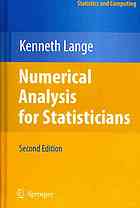

Most ebook files are in PDF format, so you can easily read them using various software such as Foxit Reader or directly on the Google Chrome browser.
Some ebook files are released by publishers in other formats such as .awz, .mobi, .epub, .fb2, etc. You may need to install specific software to read these formats on mobile/PC, such as Calibre.
Please read the tutorial at this link: https://ebookbell.com/faq
We offer FREE conversion to the popular formats you request; however, this may take some time. Therefore, right after payment, please email us, and we will try to provide the service as quickly as possible.
For some exceptional file formats or broken links (if any), please refrain from opening any disputes. Instead, email us first, and we will try to assist within a maximum of 6 hours.
EbookBell Team

0.0
0 reviewsEvery advance in computer architecture and software tempts statisticians to tackle numerically harder problems. To do so intelligently requires a good working knowledge of numerical analysis. This book equips students to craft their own software and to understand the advantages and disadvantages of different numerical methods. Issues of numerical stability, accurate approximation, computational complexity, and mathematical modeling share the limelight in a broad yet rigorous overview of those parts of numerical analysis most relevant to statisticians. In this second edition, the material on optimization has been completely rewritten. There is now an entire chapter on the MM algorithm in addition to more comprehensive treatments of constrained optimization, penalty and barrier methods, and model selection via the lasso. There is also new material on the Cholesky decomposition, Gram-Schmidt orthogonalization, the QR decomposition, the singular value decomposition, and reproducing kernel Hilbert spaces. The discussions of the bootstrap, permutation testing, independent Monte Carlo, and hidden Markov chains are updated, and a new chapter on advanced MCMC topics introduces students to Markov random fields, reversible jump MCMC, and convergence analysis in Gibbs sampling. Numerical Analysis for Statisticians can serve as a graduate text for a course surveying computational statistics. With a careful selection of topics and appropriate supplementation, it can be used at the undergraduate level. It contains enough material for a graduate course on optimization theory. Because many chapters are nearly self-contained, professional statisticians will also find the book useful as a reference. Kenneth Lange is the Rosenfeld Professor of Computational Genetics in the Departments of Biomathematics and Human Genetics and the Chair of the Department of Human Genetics, all in the UCLA School of Medicine. His research interests include human genetics, population modeling, biomedical imaging, computational statistics, high-dimensional optimization, and applied stochastic processes. Springer previously published his books Mathematical and Statistical Methods for Genetic Analysis, 2nd ed., Applied Probability, and Optimization. He has written over 200 research papers and produced with his UCLA colleague Eric Sobel the computer program Mendel, widely used in statistical genetics.